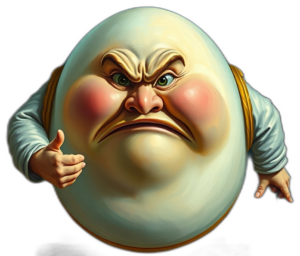“When I use a word, it means just what I
choose it to mean – neither more nor less.”Humpty Dumpty, Through the Looking Glass
The word of the day is true. Can anyone think of a sentence with the word true in it? “It’s true that the sun always rises in the East.” No, I’m afraid that’s not true. It wasn’t true before the Earth was born, and won’t be true after the sun dies, so it’s not true, it’s just something that seems to occur in this tiny speck of time and space we seem to inhabit. “It’s true that nineteen is a prime number.” No, sorry, nineteen might exist as a number in your apparent dreamstate reality, but not in truth, which must be true outside of context and independent of any other consideration. If it’s not true outside the false context of the dreamstate, it’s not true, period. “It’s true that cats always land on their feet.” Let’s not put that one to the test. “It’s true that we must die.” No, in truth, there’s no such thing as life, so there can be no such thing as death. Well, you lose. Thanks for playing our game.
Log In or Register to Continue
"I can explain all the poems that were ever invented –
and a good many that haven't been invented just yet."Humpty Dumpty
Humpty Dumpty was a peculiar and well-known figure, often remembered for his fragile nature and tragic fall. Allegedly shaped like an egg, Humpty was known to frequent high places—most famously a wall—despite the obvious risks. His unfortunate tumble from this perch became legendary, as not even the most powerful forces of his time—all the king’s horses and all the king’s men—could restore him to his former state. Humpty might be seen as a cautionary symbol of hubris, vulnerability, or the irreversible consequences of a critical misstep. His story remains an enduring metaphor for fragility and the limits of human intervention.

